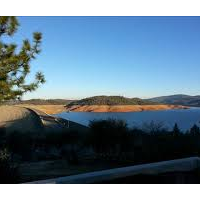Drought and Earthquakes Give New Immediacy to Anti-Fracking Efforts
 Lake Oroville (photo: Jana Frazier, California Department of Water Resources)
Lake Oroville (photo: Jana Frazier, California Department of Water Resources)
California activists have been working to institute a moratorium on hydraulic fracturing, or fracking, by oil and gas drillers despite industry claims of the practice’s long-term safety. Now two better known aspects of the Golden State—earthquakes and droughts—are providing stronger arguments for ending fracking operations.
California is currently drier than it’s ever been, thanks to a drought now in its third year. Reservoir levels have plummeted, and many farmers have been cut off from government water programs. Now that water is so precious, critics of fracking are using the state’s thirst to argue California cannot afford to waste water to support oil drilling.
In fracking, water mixed with hazardous chemicals is injected deep into the earth to break up shale formations containing fossil fuels.
Opponents point out that fracking a single oil well uses an average of 127,127 gallons of water a year, close to the 146,000 needed to support a family of four for a year, based on figures provided by the Western States Petroleum Association, a major oil lobby.
Then there’s the earthquake problem.
There have been some noticeable tremblers recently in Southern California. The industry says, so what? Earthquakes are almost as common as sunshine in the state.
But now states that historically have had little seismic activity, such as Oklahoma, are seeing earthquakes. And perhaps not coincidentally, there is significant fracking in those places, giving critics another weapon to use in lobbying for banning the practice in California, saying the work may be causing the ground to shake more.
Between the drought and earthquake concerns, opponents have managed to convince about a dozen local governments in the state to curtail or prohibit fracking altogether. These include Butte County, home of California’s second largest reservoir, Lake Oroville, which has lost a third of its water during the drought. Berkeley, Beverly Hills, Carson, Culver City and Fairfax, plus Marin County have also adopted anti-fracking measures.
On Tuesday, Santa Cruz became the first county to ban fracking outright, a symbolic step in light of the fact it has no oil or gas production.
Next, fracking opponents are aiming for the state level. A bill introduced in the state Senate would establish a temporary moratorium on fracking while experts study its effects.
“There will be a statewide moratorium, whether it comes this year, next year or the year after that,” Kathryn Phillips, director of Sierra Club California, told The New York Times. “Even if we don’t get a moratorium, just the threat of a moratorium discourages investment.”
Catherine Reheis-Boyd, Western States Petroleum Association’s president, has been taken aback as opponents have used the drought and earthquakes to their political advantage.
“Both of these issues are being used because it elevates the conversation, because people would be concerned normally about water in a drought year and any kind of seismic activity,” she told the Times.
–Noel Brinkerhoff
To Learn More:
California’s Thirst Shapes Debate over Fracking (by Norimitsu Onishi, New York Times)
Local Actions Against Fracking (Food & Water Watch)
Santa Cruz Becomes First California County to Ban Fracking (by Rory Carroll, Reuters)
Beverly Hills Becomes First City in California to Impose a Ban on Fracking (by Noel Brinkerhoff, AllGov)
Environmentalists Didn't Care Much for New State Fracking Law, and That Was Before They Found Non-Compliance (by Ken Broder, AllGov California)
- Top Stories
- Controversies
- Where is the Money Going?
- California and the Nation
- Appointments and Resignations
- Unusual News
- Latest News
- California Forbids U.S. Immigration Agents from Pretending to be Police
- California Lawmakers Urged to Strip “Self-Dealing” Tax Board of Its Duties
- Big Oil’s Grip on California
- Santa Cruz Police See Homeland Security Betrayal in Use of Gang Roundup as Cover for Immigration Raid
- Oil Companies Face Deadline to Stop Polluting California Groundwater





